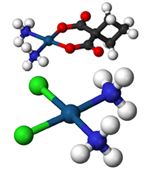New Marker for Triple-Negative Breast Cancer Shows Potential in Predicting Chemo Response
Researchers have identified a marker of DNA damage that may be able to predict a patient’s response to platinum-based chemotherapy agents such as cisplatin and carboplatin.
Researchers have identified a marker of DNA damage that may be able to predict a patient’s response to platinum-based chemotherapy agents such as cisplatin and carboplatin.

3D model of carboplatin (top) and cisplatin (bottom)
Platinum-based chemotherapy is widely used as systemic treatments for ovarian and lung cancers as well as other types of tumors. Unfortunately, there is no way to predict whether a patient will respond to chemotherapy.
The marker identified by researchers-telomeric allelic imbalance-has the potential to predict whether a patient with triple-negative breast cancer will respond to platinum-based chemotherapy.
The authors additionally found an inverse relationship between the level of telomere allelic imbalance and the tumor expression of BRCA1. The results, from a team at the Dana-Farber Cancer Institute in Boston, are published in Cancer Discovery, a journal of the American Association for Cancer Research.[1]
There are currently no targeted agents available for triple-negative breast cancer, a subtype of breast cancer that is a heterogeneous group of tumor types that expresses neither estrogen-receptor, progesterone-receptor, nor HER2. When discovered late, triple-negative breast cancer is typically aggressive and difficult to treat.
"We currently do not have any targeted therapies for patients with triple-negative breast cancer, so if these laboratory findings are confirmed and an assay is created to predict sensitivity to drugs that target defective DNA repair, it would be a major step forward," according to Andrea Richardson, MD, PhD, lead pathologist and assistant professor of medicine at the Dana-Farber Cancer Institute, and one of the study coauthors.
The Rationale and Results
The ability to repair DNA is one way to measure whether a particular tumor will be sensitive to chemotherapy agents. Tumor cells that have functional DNA-repair pathways will not accumulate DNA damage caused by chemotherapy to the same extent as cells that have impaired DNA-repair function.
The authors looked for genomic signatures of defective DNA repair in tissue culture and tumor cells and correlated the signatures to platinum chemotherapy sensitivity. They found that allelic imbalances near the ends of chromosomes, called telomeres, could predict sensitivity to cisplatin both in vitro and in primary tissue from patients with triple-negative breast cancer and serous ovarian cancer. These accumulated telomoric imbalances are likely an indication of impaired DNA-repair function, according to the authors.
The telomere allelic imbalance, "a genomic measure of unfaithfully repaired DNA," could identify cancer patients that are more likely to benefit from treatments that take advantage of a tumor cell's defective DNA repair, concluded the authors. Allelic imbalances in general are likely due to improper DNA double-stranded break repair during the replication cycle of tumor cells. Subtelomeric and telomeric regions are known sites in the genome that are more difficult to replicate, where single and double-stranded breaks are more likely to form.
The research also showed an inverse relationship between telomere allelic imbalance and BRCA1 expression in triple-negative breast cancer and serous ovarian cancers with no BRCA1 or BRCA2 mutations. Mutations in the BRCA genes cause defects in DNA repair. The protein products of these genes function in DNA repair, cell cycle checkpoints, and DNA replications. It is likely that lower BRCA1 activity contributes to impaired DNA repair, including telomere allelic imbalance.
The authors analyzed 2 clinical trials of women with triple-negative breast cancer in which the women were treated with cisplatin before surgery. The pathological response at the time of surgery was a way to assess the sensitivity of the tumor to platinum-based chemotherapy.
An assay to measure telomeric allelic imbalances is feasible, according to the authors. Formalin-fixed paraffin embedded tumor material can be readily used and algorithms can be used to measure the copy number and allelic imbalance in tumor cells-even in a low tumor cell sample.
Reference
1. Nicolai J. Birkbak, Zhigang C. Wang, Ji-Young Kim, et al. Telomeric Allelic Imbalance Indicates Defective DNA Repair and Sensitivity to DNA-Damaging Agents. Cancer Discovery. 2012 Mar 22. [Epub ahead of print]